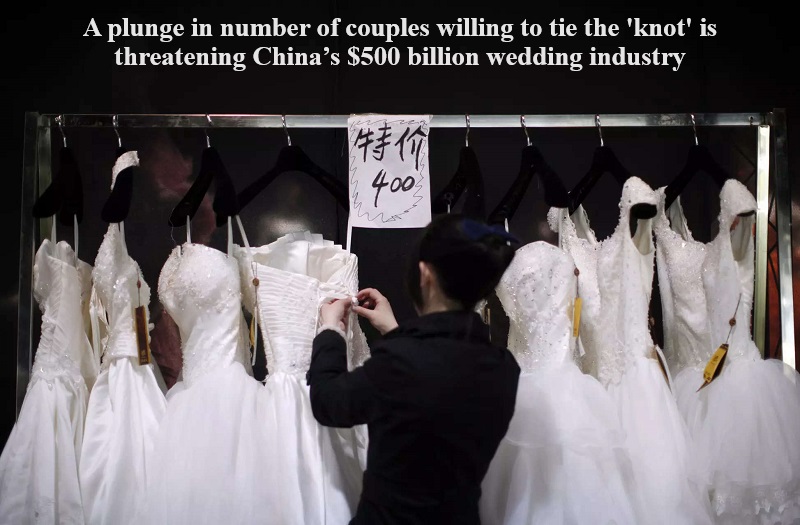
The wedding planning industry in China, renowned for its extravagant and costly ceremonies, has not had an easy time due to the challenges posed by Covid-19. However, it now confronts an even greater threat: a sharp decline in the number of couples willing to take the marital plunge. This worrisome trend, exacerbated by economic uncertainties and dwindling consumer confidence, is a cause for concern among officials aiming to stimulate both marriage and birth rates, which hit record lows last year, leading to China’s first population decline in six decades.
“The number of marriages is falling, and few are willing to spend a lot on weddings,” lamented Yuan Jialiang, who ran a comprehensive wedding planning business in Shanghai for nearly a decade before shifting focus to wedding photography prior to the pandemic. “The future of this industry doesn’t look promising.”
In 2021, there were 6.8 million marriages in China, marking a decrease of 800,000 compared to 2020, and the lowest figure since the government began recording this data in 1986. This drop in marriage registrations exacerbates China’s ongoing birth rate decline, contributing to the country’s status as one of the world’s fastest-aging societies. Unmarried mothers often encounter difficulties in accessing child-raising and healthcare subsidies, and having children outside of wedlock is frequently met with disapproval.
Many Chinese young adults are choosing not to marry, deeming it financially burdensome to raise children. Ben Cavender, Managing Director and Head of Strategy at China Market Research Group, observed, “You have a lot of consumers that are just saying ‘well, you know, marriage isn’t the right thing for me.'”
Before the pandemic, the wedding industry was booming in China, estimated to be worth $487 billion in 2020 by Daxue Consulting. Traditionally, couples invested in gold jewelry, extravagant decor, and luxury venues, but now, wedding budgets have dramatically shrunk. Frank Chen from Chen Feng Wedding Planning in Shanghai noted that few weddings in 2023 exceeded a budget of $13,736, a stark contrast to the lavish million-dollar celebrations of a decade ago.
The economic downturn, particularly affecting the middle class and youth with high unemployment rates and reduced household spending, has been a key factor. Wealthier consumers are relatively shielded from economic turbulence. Jewel Wang, owner of a network of wedding dress stores featuring designs by renowned names like Vera Wang, anticipates that high-end and bespoke services will fare better than lower-to-middle-range options. Wang emphasizes the importance of catering to brides who can afford their premium products rather than striving to capture a larger market share.
Despite some pockets of success due to pent-up demand, Wang remains cautious about the future, recognizing the broader downturn in spending. Her strategy is to remain niche and not follow the broader market, a sentiment echoed by others in the industry who believe that adapting to changing consumer preferences is crucial for survival.

Post Your Comments